
Pierre Gustave Toutant-Beauregard, of Louisiana Creole descent, was the Confederate General who started the American Civil War at the battle of Fort Sumter on April 12, 1861. Today, he is commonly referred to as P. G. T. Beauregard, but he rarely used his first name as an adult. He signed correspondence as G. T. Beauregard.

Natchez, officially the City of Natchez, is the only city in and the county seat of Adams County, Mississippi, United States. The population was 14,520 at the 2020 census. Located on the Mississippi River across from Vidalia in Concordia Parish, Louisiana, Natchez was a prominent city in the antebellum years, a center of cotton planters and Mississippi River trade.

Pinckney Benton Stewart Pinchback was an American publisher, politician, and Union Army officer. Pinchback was the second African American to serve as governor and lieutenant governor of a U.S. state. A Republican, Pinchback served as acting governor of Louisiana from December 9, 1872, to January 13, 1873. He was one of the most prominent African-American officeholders during the Reconstruction Era.
Elizabeth "Eliza" Lucas Pinckney transformed agriculture in colonial South Carolina, where she developed indigo as one of its most important cash crops. Its cultivation and processing as dye produced one-third the total value of the colony's exports before the Revolutionary War. Manager of three plantations, Pinckney had a major influence on the colonial economy.

In the context of the history of slavery in the Americas, free people of color were primarily people of mixed African, European, and Native American descent who were not enslaved. However, the term also applied to people born free who were primarily of black African descent with little mixture. They were a distinct group of free people of color in the French colonies, including Louisiana and in settlements on Caribbean islands, such as Saint-Domingue (Haiti), St. Lucia, Dominica, Guadeloupe, and Martinique. In these territories and major cities, particularly New Orleans, and those cities held by the Spanish, a substantial third class of primarily mixed-race, free people developed. These colonial societies classified mixed-race people in a variety of ways, generally related to visible features and to the proportion of African ancestry. Racial classifications were numerous in Latin America.

Elizabeth Meriwether Gilmer, widely known by the pen name Dorothy Dix, was an American journalist and columnist. As the forerunner of today's popular advice columnists, Dix was America's highest paid and most widely read female journalist at the time of her death. Her advice on marriage was syndicated in newspapers around the world. With an estimated audience of 60 million readers, she became a popular and recognized figure on her travels abroad. In addition to her journalistic work, she joined in the campaign for woman suffrage and the ratification of the Nineteenth Amendment to the U.S. Constitution.
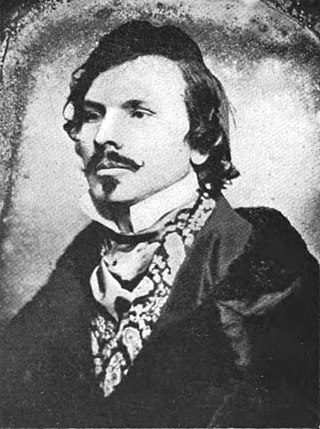
Thomas Mayne Reid was an Irish-American novelist who fought in the Mexican–American War (1846–1848). His many works on American life describe colonial policy in the American colonies, the horrors of slave labour, and the lives of American Indians. "Captain" Reid wrote adventure novels akin to those by Frederick Marryat and Robert Louis Stevenson. They were set mainly in the American West, Mexico, South Africa, the Himalayas, and Jamaica. He was an admirer of Lord Byron. His novel Quadroon (1856), an anti-slavery work, was later adapted as a play entitled The Octoroon (1859) by Dion Boucicault and produced in New York.

Richard "Dick" Taylor was an American planter, politician, military historian, and Confederate general. Following the outbreak of the American Civil War, Taylor joined the Confederate States Army, serving first as a brigade commander in Virginia and later as an army commander in the Trans-Mississippi Theater. Taylor commanded the District of West Louisiana and opposed United States troops advancing through upper northwest Louisiana during the Red River Campaign of 1864. He was the only son of Zachary Taylor, the 12th president of the United States. After the war and Reconstruction, Taylor published a memoir about his experiences.
A filibuster, also known as a freebooter, is someone who engages in an unauthorized military expedition into a foreign country or territory to foster or support a political revolution or secession. The term is usually applied to United States citizens who incited insurrections across Latin America, particularly in the mid-19th century, usually with the goal of establishing an American-loyal regime that could later be annexed into the United States. Probably the most notable example is the Filibuster War initiated by William Walker in Nicaragua in the 1850s.
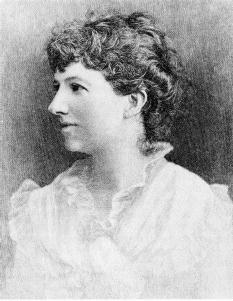
Grace Elizabeth King was an American author of Louisiana stories, history, and biography, and a leader in historical and literary activities.
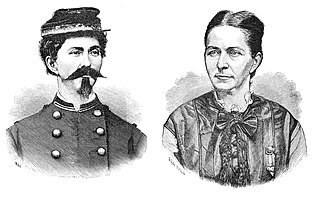
Loreta Janeta Velázquez was an American woman who wrote that she had masqueraded as a male Confederate soldier during the American Civil War. The book she wrote about her experiences says that after her soldier husband's accidental death, she enlisted in the Confederate States Army in 1861. She then fought at Bull Run, Ball's Bluff, and Fort Donelson, but was discharged when her sex was discovered while in New Orleans. Undeterred, she reenlisted and fought at Shiloh, until unmasked once more. She then became a Confederate spy, working in both male and female guises, and as a double agent also reporting to the U.S. Secret Service. She remarried three more times, being widowed in each instance. According to William C. Davis, she died in January 1923 under the name Loretta J. Beard after many years away from the public eye in a public psychiatric facility, St. Elizabeths Hospital. Most of her claims are not supportable with actual documents, and many are contradictable by actual documentation.
Plaçage was a recognized extralegal system in French and Spanish slave colonies of North America by which ethnic European men entered into civil unions with non-Europeans of African, Native American and mixed-race descent. The term comes from the French placer meaning "to place with". The women were not legally recognized as wives but were known as placées; their relationships were recognized among the free people of color as mariages de la main gauche or left-handed marriages. They became institutionalized with contracts or negotiations that settled property on the woman and her children and, in some cases, gave them freedom if they were enslaved. The system flourished throughout the French and Spanish colonial periods, reaching its zenith during the latter, between 1769 and 1803.

Paul Octave Hébert was a soldier and politician who served as 14th Governor of Louisiana from 1853 to 1856. A veteran of the Mexican-American War, he later served as a brigadier general in the Confederate States Army.

Chatham Roberdeau Wheat was a captain in the United States Army Volunteers during the Mexican War, Louisiana State Representative, lawyer, mercenary in Cuba, Mexico, and Italy, adventurer, and major in the Confederate States Army during the American Civil War.

Gwendolyn Midlo Hall was an American historian who focused on the history of slavery in the Caribbean, Latin America, Louisiana, Africa, and the African Diaspora in the Americas. Discovering extensive French and Spanish colonial documents related to the slave trade in Louisiana, she wrote Africans in Colonial Louisiana: The Development of Afro-Creole Culture in the Eighteenth Century (1992), studied the ethnic origins of enslaved Africans brought to Louisiana, as well as the process of creolization, which created new cultures. She changed the way in which several related disciplines are researched and taught, adding to scholarly understanding of the diverse origins of cultures throughout the Americas.
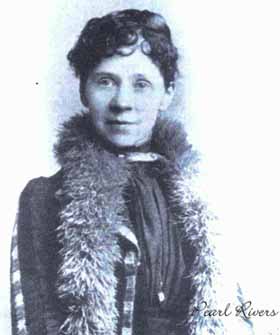
Pearl Rivers was an American journalist and poet, and the first female editor of a major American newspaper. After being the literary editor of the New Orleans Times Picayune, Rivers became the owner and publisher in 1876 when her elderly husband died. In 1880, she took over as managing editor, where she continued until her death in 1896.
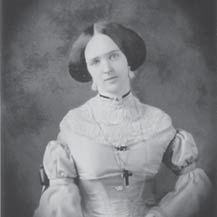
Lucy Petway Holcombe Pickens was a 19th-century American socialite of Tennessee and Texas, known during and after her lifetime as the "Queen of the Confederacy". She was also a First Lady of South Carolina. Described as "beautiful, brilliant, and captivating" by her male contemporaries, she helped shape the stereotype of the "Southern belle." Born into a planter's family, she moved with them to Marshall, Texas, the seat of Harrison County, at age 16.

François-Gabriel "Valcour" Aime (1797–1867) was an American sugar planter, slave owner, philanthropist, and pioneer in the large-scale refining of sugar. Known as the "Louis XIV of Louisiana," he was reputedly the wealthiest person in the South.
Donald Barr Chidsey was an American writer, biographer, historian, novelist and writer of adventure fiction.

Caroline Elizabeth Merrick was an American writer and temperance worker. She is the author of Old Times in Dixie Land: a Southern Matron's Memories (1901). Taking an active part in the charitable and philanthropic movements of New Orleans, she served as president of the Ladies' Sanitary and Benevolent Association, of the Woman's Foreign Missionary Society of the Methodist Episcopal Church, and of the Woman's League of Louisiana.
















